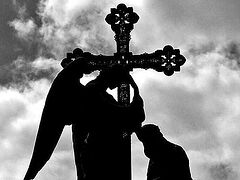I recently spoke with a dear friend who dolefully reported that a distant family member had left his very traditional Protestant church (with its stress on doctrine and Reformed worship) for a group called “The Bridge”. The name of the group reminded me of similar names of such new churches, such as “Connect”, and “Relate”—i.e. the names were intended to highlight their emphasis on relationships. So much for “St. James Anglican Cathedral”, or “Ferndale Baptist Church”, or even “Living Waters Pentecostal Assembly”.
As well as emphasizing their hope of new members forging relationships at church, the unusual names also served to emphasize how the community was unique, new, daring, un-traditional, innovative, and exciting. To me, however, the name simply served to demonstrate how all the new unique churches were absolutely cookie-cutter identical and completely interchangeable: the same praise band, the same large staff, the same offering of para-church groups, the same self-help sermons sprinkled with God-talk, and the same lattes available during the service.
The more I perused their website, the more I began to see my friend’s point and the more doleful I became as well. The founders of these communities are very business savvy: they know very well that many people feel isolated from others, and long for connection. We rarely know all the neighbours on our street as our fathers and grandfathers once did, and we are cloistered behind our anonymous keyboards and cellphones. We may have 450 Facebook friends, but cannot name the children of our next-door neighbour. We feel cut off from others because we are cut off, and so we are starved for relationship and connection.
Enter the Bridge—or Connect, or Relate, or whatever name it goes by, a group promising hungry people that they can provide what they are longing for. (It reminds me of the old tele-evangelists promising divine healing to those suffering from cancer, if only they would believe—and of course, send money.) Those attending the praise band churches are good people. They are also what professional salesmen term “motivated buyers”.
None of this, of course, is wrong, and none of it in itself de-legitimizes those groups. Indeed, thriving Orthodox missions also try their best to provide a healing matrix of relationship and love to those who join them and offer them a close-knit church family. We are social animals made for such relationships, and the Church is part of God’s provision for us.
The problem (and the source of my friend’s dolefulness) is the length to which such groups will sometimes go to provide welcome. The emphasis is on “inclusiveness” (a magic word which shows up reliably in almost every website promoting such groups). If by “inclusive” was meant that no one was disdained or turned away because they were of a certain colour, language, ethnicity, or if they were poorly dressed, this would be laudable. But I’m afraid it often means something very different.
For example, one website promoting an Anglican congregation answers the question, “Are you inclusive and affirming?” by declaring that their congregation “welcomes and celebrates all people regardless of gender, gender identity, sexual orientation, or marital status. We believe and preach that all people are made in the image of God and are worthy of love, belonging and safety.” In plainer speech, they mean that those who are practising homosexuals or transgender or who are sexually active outside of marriage will not find such choices subject to correction or condemnation, but will be affirmed and celebrated.
The Bridge is also concerned to affirm. On their website, under the “Our Values” tab, and under the sub-heading of “Inclusive”, they declare, “We believe that both male and female are full participants in God’s community. It’s not your gender, but your GIFTS that determine your ministry. We believe everyone is called to ministry. Everyone is a ‘10’ at something. We do everything in TEAM… People are all at different places on their journey. At no juncture is it part of a person’s ministry to judge anyone.”
I smiled a bit at their bold declaration that both male and female are “full participants” in ministry at the Bridge as if it were daring and new, and which the older mainline churches have been doing for about fifty years now. Of greater interest was their declaration that “everyone is a ‘10’ at something”.
This is clearly nonsense. Speaking of the person I know best (i.e. myself) I am not a ‘10’ at anything—and I am perfectly okay with it. Like everyone else, I do certain things very well, certain things less well, and many things very badly. Telling everyone that they are a ‘10’ at something is flattery, pure and simple. It aims at increasing their self-esteem and making them feel good about themselves, whether they deserve it or not.
Significant too is their declaration that that “at no juncture is it part of a person’s ministry to judge anyone.” That too is nonsense. In fact, it is the Church’s job, through its clergy, to judge and to declare what is right and what is wrong. We have this from St. Paul, who writes about those impenitently doing what is wrong that the local church must “Remove the wicked man from among yourselves” (1 Corinthians 5:13). The Church is a hospital for sinners, but it presupposes that the sick sinner wants to be made well. If the sick sinner denies he is sick and embraces and justifies his sin, judgment from the local church (i.e. expulsion) is required.
Here then is the main problem with churches which make “inclusiveness” the sole and governing virtue (or, if you prefer, their ruling passion): that community has abandoned its God-given mandate to exhort its members to repentance. In place of messages condemning sin and encouraging repentance, the members are treated to a continual warm bath of affirmation aimed at increasing their self-esteem. You are not a sick sinner, fighting for health; you are a ‘10’, and no one may judge you lest it decrease your self-esteem and make you feel bad. Such churches are trap-doors to hell.
Hopefully the Bridge is not among such places, and it offers a better homiletical diet than suggested on its website. I am happy to give them the benefit of the doubt. But one thing is certain: any church worthy of the name has a duty not only to welcome all sinners to the embrace of Christ and the embrace of their fellow-members. It also has a duty to warn its members of the consequences of sin and the folly of following the World in this crooked and perverse generation. The Church must be a bridge from earth to heaven, and the bridge and the path on it which leads to life is narrow (Matthew 7:14). The task of the Church is encourage its members as they walk that narrow path, and as they cross that bridge.





